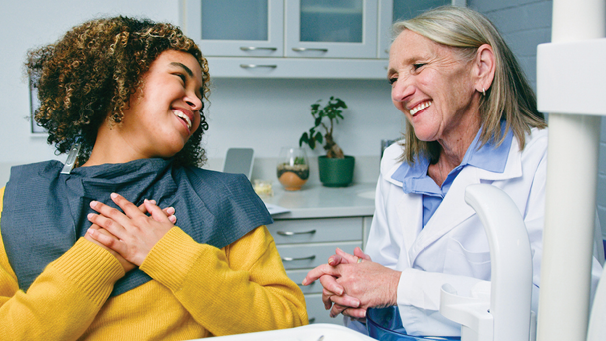
Will Guidara, renowned restaurateur and author of Unreasonable Hospitality, emphasizes the importance of “Let your energy impact the people you’re talking to, as opposed to the other way around.” This wisdom isn’t limited to the hospitality industry; it holds relevance in any field where you interact with people, including dentistry.
As a dental student, I may not yet have the privilege of working chairside, but what I do have is a deep curiosity about how people feel—not just about their teeth, but about the experience of sitting in that chair, the weight of their fears, and the relief of leaving pain-free. My educational background in psychology and work experience as a dental receptionist have validated this phenomenon: that emotions ripple outward, shaping the energy in the room. And in dentistry, where anxiety and anticipation often run high, understanding that ripple effect can be just as important as perfecting that 2.7 restoration.
At the Federation of Canadian Dentistry Student Associations (FCDSA) conference in early January, Dr. Nekky Jamal, a compelling lecturer, teacher, and clinician, discussed one of the main challenges that dentists face when working with patients with anxiety—how the anxiety of a patient with an elevated heartbeat can become contagious, and how your heart can synchronize with theirs. Before you know it, both you and your patient are caught in a loop of uncontrolled heartbeat, making it even harder to provide care.
Even in less extreme situations, the same psychological forces are at play. When a patient walks into your office after a long, exhausting day at work, they’re likely stressed—anticipating the financial cost of treatment and perhaps dreading seeing you, the person who last drilled a hole in their tooth. To them, you might be an unwelcome reminder of past discomfort—physically, financially, and emotionally.
So, what should be done? The answer lies in Guidara’s philosophy: let your energy positively impact theirs. Be the wave that lifts others up. Shift their focus, which, from time to time, might mean distracting them. Remind them of the relief they felt when they walked out of your office last time, free of pain. Highlight the privilege of being able to take a moment for themselves, away from their hectic work schedule. Show them the brighter side—the confidence they’ll gain when they hold up the mirror and see a healthy, happy smile.
For as long as I can remember, my mother and her team embodied this approach. They were all-in in their pursuit of making patients feel uplifted. Whether it was serving the best specialty coffees in the waiting room, pairing them with locally made pastries, or chatting with patients for 30 minutes as they poured their hearts out before they even began the procedure, they made sure that every visit felt like more than just a dental appointment. This thoughtful hospitality transformed even the most tired or difficult patients into loyal, grateful members of her extended family.
As Guidara persuasively states:
“When you work in hospitality, you have the privilege of joining people as they celebrate the most joyful moments in their lives and the chance to offer them a brief moment of consolation and relief in the midst of their most difficult ones.”
Dentistry is no different. Whether you’re a practicing dentist, a dental student, or part of the dental team, you have the unique opportunity to bring comfort during your patients’ most vulnerable moments. You can help them celebrate the return of their smiles while providing relief when they need it most.
In dental school, we’re frequently reminded of our responsibilities as healthcare providers: protecting our patients’ health, safety, and privacy. These responsibilities form a long and weighty list we carry with us daily. But why not make that list even more meaningful? Add the responsibility of giving people more than they expect.
And so, look across every discipline, in every arena—restaurants, design, technology, health—”you need to be unreasonable to see a world that doesn’t yet exist.” And so, be unreasonable in your pursuit of your patients. Let your energy lift them, guide them, and leave them with an experience they’ll cherish long after they leave your office.
About the author

Sara Arbabzadehbroujeni is a first-year dental student at Dalhousie University School of Dentistry with a passion for redefining patient care. She holds a Bachelor of Science degree in Psychology from York University, where she honed her understanding of human behavior and its impact on patient experiences. Her experiences working in a dental office and later at Wealthsimple, a Canadian fintechcompany, taught her the importance of meaningful details of human interaction alongside the innovative use of technology in shaping one’s perception of care.

